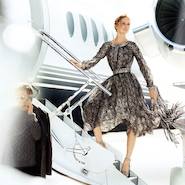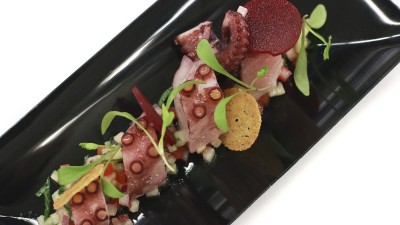 Michael Kors fall/winter 2014 ad campaign
Michael Kors fall/winter 2014 ad campaign
International tourism will grow 4.3 percent in 2016, with demand highest in Asia and North America, according to a Positive Luxury study on the state of travel.
Alongside shifts to personalization and emphases on philanthropy and sustainability, assumptions about who travels and when travel happens are also breaking down. The continued growth of travel beyond that of other luxury sectors puts hotels in an enviable place, but capitalizing on that growth will require strategic shifts.
"Innovation in the sector is perhaps the biggest challenge to date, with consumers' hunger for information putting pressure and demand on the industry, as well as the concept of niche and personalized travel, with brands having to think completely outside of the box to offer services beyond the norm," said Tim Jackson, author of the report for Positive Luxury, London. "Within this new paradigm, hotels and travel operators will need to find the balance between the out of this world, immersive experience and having a positive impact on the environment and society."
“The Future is Now: What’s Shaking Up the Travel Industry” draws on research, insights from conferences and interviews with influencers, experts and C-suite executives to illuminate key issues impacting the travel industry.
Offseason
Growth in international tourism is fueled by increased demand in trips to cities during the “offseason” and spontaneous weekend breaks. With aspirational consumers wanting experiences rather than products, hotels need to be prepared to reach these consumers on those off-season trips and especially those spontaneous weekend getaways.
The growth in off-season travel is linked to more visible trends. The desire to experience different cultures – a priority for 38 percent of travelers – is most compatible with visiting during a time when a city will not be flooded with tourists and time spent visiting more closely aligns with the local life.
 Luxury Aircraft Solutions travelers
A taste for local culture has also led to diminishing popularity of beach vacations, particularly among millennials. Hiking, opportunities to interact with indigenous peoples and adventures that differ from the traditional resort lifestyle strike a stronger chord among these consumers.
Weekend getaways and cultural immersion also share a probable link with the explosion of social media. The travel of others can now be consumed via outlets such as Instagram, sparking wanderlust in followers. Likewise, it is easier than ever to share deals, make itineraries and connect with locals via social media, enabling weekend trips.
Consumers expect access to non-packaged destinations rather than more traditional curated experiences that hotels offer. Hotels putting together city or cultural immersion packages need to find a convincing way to assure those consumers that such offerings are not manicured.
This is not exclusive to millennials. Positive Luxury cites TripAdvisor data finding that culture interests also drive 50 percent of baby boomers, compared to 47 percent of global travelers. For many, cuisine is synonymous with culture – hotels promising the right meals can capture a subset of these travelers.
Brands must find a way to offer an authentic experience without commodifying that same experience. Localized getaways that offer cultural immersion are preferable to branded hotels for many consumers, pressuring brands to find ways to win them back.
Luxury Aircraft Solutions travelers
A taste for local culture has also led to diminishing popularity of beach vacations, particularly among millennials. Hiking, opportunities to interact with indigenous peoples and adventures that differ from the traditional resort lifestyle strike a stronger chord among these consumers.
Weekend getaways and cultural immersion also share a probable link with the explosion of social media. The travel of others can now be consumed via outlets such as Instagram, sparking wanderlust in followers. Likewise, it is easier than ever to share deals, make itineraries and connect with locals via social media, enabling weekend trips.
Consumers expect access to non-packaged destinations rather than more traditional curated experiences that hotels offer. Hotels putting together city or cultural immersion packages need to find a convincing way to assure those consumers that such offerings are not manicured.
This is not exclusive to millennials. Positive Luxury cites TripAdvisor data finding that culture interests also drive 50 percent of baby boomers, compared to 47 percent of global travelers. For many, cuisine is synonymous with culture – hotels promising the right meals can capture a subset of these travelers.
Brands must find a way to offer an authentic experience without commodifying that same experience. Localized getaways that offer cultural immersion are preferable to branded hotels for many consumers, pressuring brands to find ways to win them back.
 Food from Lisbon festival prepared by Four Seasons Lisbon chef
These experiences dovetail with personalized guided tours, growing fastest among solo travelers from the U.S., South Korea and India.
In addition to increasing travel desire, connection and authenticity, the study also examines wellness, sustainability, the sharing economy and technology in relation to travel.
New priorities
With growing attentiveness to the planet’s health among people informing consumerist behavior, hotels are positioning themselves as leaders in luxury with regard to sustainability.
Sustainability initiatives are on the rise in luxury, but the hospitality sector will need to make their efforts more visible to bring consumers on board.
According to Booking.com’s Sustainable Travel Report, lack of awareness was the primary reason consumers did not plan on staying in eco-friendly accommodations. With an interest in protecting the environment on the rise, hotels must educate consumers on what they are doing on this front in order to win over the new, green consumer (see story).
Over the next several years, the travel industry will get a rush of consumers from Mainland China as monetary growth continues to outpace that of western economies.
China’s outbound luxury travelers spend $65,000 per household on tourism per year, including $34,000 on travel shopping, according to a recent study from the Hurun Research Institute and Marriott International.
Chinese outbound tourists have long been a high-priority group for luxury brands, but the demands and habits of younger travelers are changing quickly. The digital natives aged between 18 and 36 years old want a more personalized experience, including superior guest services and smart device integration (see story).
"The majority of trends discussed in the report cut across millennials globally, however some are cross generational too," Mr. Jackson said. "Luxury travelers across generations are searching for more authentic experiences and visiting unique destinations, with more control over their experience and white a higher need for authenticity.
"Technology is creating new opportunities for hotels to speak in the language of their audience, with mobile platforms and virtual and augmented reality offering both the convenience and immersive experiences which are craved by their audiences."
Food from Lisbon festival prepared by Four Seasons Lisbon chef
These experiences dovetail with personalized guided tours, growing fastest among solo travelers from the U.S., South Korea and India.
In addition to increasing travel desire, connection and authenticity, the study also examines wellness, sustainability, the sharing economy and technology in relation to travel.
New priorities
With growing attentiveness to the planet’s health among people informing consumerist behavior, hotels are positioning themselves as leaders in luxury with regard to sustainability.
Sustainability initiatives are on the rise in luxury, but the hospitality sector will need to make their efforts more visible to bring consumers on board.
According to Booking.com’s Sustainable Travel Report, lack of awareness was the primary reason consumers did not plan on staying in eco-friendly accommodations. With an interest in protecting the environment on the rise, hotels must educate consumers on what they are doing on this front in order to win over the new, green consumer (see story).
Over the next several years, the travel industry will get a rush of consumers from Mainland China as monetary growth continues to outpace that of western economies.
China’s outbound luxury travelers spend $65,000 per household on tourism per year, including $34,000 on travel shopping, according to a recent study from the Hurun Research Institute and Marriott International.
Chinese outbound tourists have long been a high-priority group for luxury brands, but the demands and habits of younger travelers are changing quickly. The digital natives aged between 18 and 36 years old want a more personalized experience, including superior guest services and smart device integration (see story).
"The majority of trends discussed in the report cut across millennials globally, however some are cross generational too," Mr. Jackson said. "Luxury travelers across generations are searching for more authentic experiences and visiting unique destinations, with more control over their experience and white a higher need for authenticity.
"Technology is creating new opportunities for hotels to speak in the language of their audience, with mobile platforms and virtual and augmented reality offering both the convenience and immersive experiences which are craved by their audiences."
